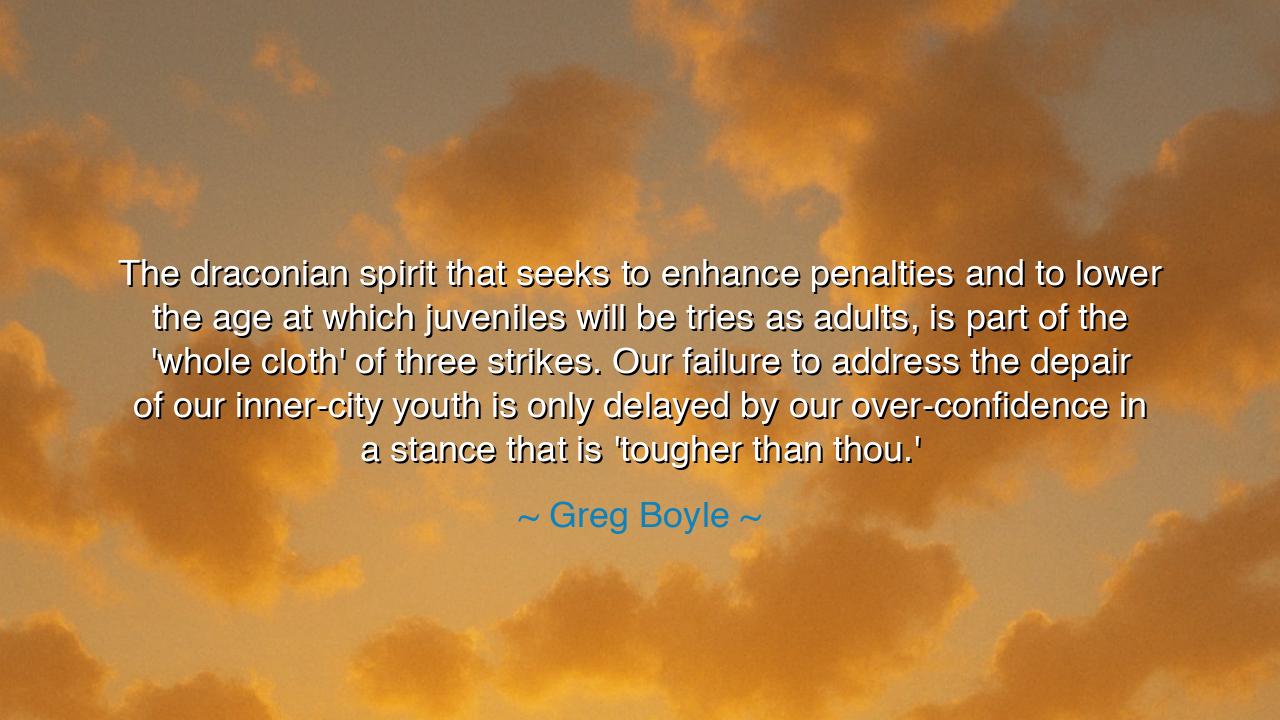
The draconian spirit that seeks to enhance penalties and to lower
The draconian spirit that seeks to enhance penalties and to lower the age at which juveniles will be tries as adults, is part of the 'whole cloth' of three strikes. Our failure to address the depair of our inner-city youth is only delayed by our over-confidence in a stance that is 'tougher than thou.'






In the vast expanse of human society, there are times when the weight of justice is pressed upon the weakest, and the harshness of the laws only deepens the wounds of those already suffering. Greg Boyle speaks of this imbalance when he says, "The draconian spirit that seeks to enhance penalties and to lower the age at which juveniles will be tried as adults, is part of the 'whole cloth' of three strikes. Our failure to address the despair of our inner-city youth is only delayed by our over-confidence in a stance that is 'tougher than thou.'" In these words, Boyle challenges a legal system that, in its pursuit of retribution, ignores the deeper roots of suffering, inequality, and disenfranchisement. His words call us to examine not just the laws we create, but the human conditions that shape the lives of the most vulnerable among us.
The ancients understood that justice must be tempered by wisdom, and that a society’s laws are most powerful when they serve the common good rather than simply punish those who fall short. Plato, in his works, often spoke of the ideal society, where laws were not mere tools of retribution, but instruments of correction and healing. For Plato, justice was about balance—about ensuring that each individual received not just punishment, but also guidance and opportunity for redemption. In much the same way, Greg Boyle’s critique of the legal system points to a flaw in a justice system that seeks to punish rather than understand the root causes of crime and despair.
Consider the story of Marcus Aurelius, the Roman emperor and philosopher, who, despite his power, believed that true leadership lay in the understanding of human suffering. Aurelius often wrote in his personal journals about the need to rule with compassion, understanding that those who committed wrongs were often shaped by their circumstances. His philosophy echoed the teachings of Socrates, who saw justice not as mere punishment, but as a means of transforming the soul. Similarly, Boyle’s reflection on the juvenile justice system and its focus on penalties rather than rehabilitation speaks to a society that has forgotten the importance of compassion and understanding in its approach to crime and punishment.
In the United States, the three strikes law, which mandates life sentences for individuals convicted of three felonies, has often been criticized for its overly harsh approach, particularly for non-violent offenses. The law was enacted with the belief that it would deter crime, but instead, it has disproportionately affected minority communities and youths from disadvantaged backgrounds. Boyle’s words draw attention to the reality that, while society may believe it is being tougher on crime, it is often failing to address the deeper issues that lead young people to desperation in the first place—poverty, lack of opportunity, and systemic inequality. Just as the ancient Greeks sought a balance between justice and mercy, Boyle calls for a justice system that addresses the causes of crime rather than simply responding to its symptoms.
The story of Nelson Mandela offers a modern example of compassionate justice. After spending 27 years in prison for his fight against apartheid, Mandela emerged not with a desire for revenge but with a vision of reconciliation. He recognized that true healing could only come from addressing the root causes of division and suffering, rather than simply punishing those who had perpetrated injustice. His approach to justice, founded in forgiveness and understanding, stands in stark contrast to the draconian methods that Boyle critiques. Mandela understood that to truly uplift a society, we must first address the human dignity of those who are oppressed, rather than perpetuating cycles of punishment that only deepen the divide.
The lesson from Boyle’s words is clear: a justice system that focuses solely on punishment, without seeking to understand the humanity of those it affects, is a flawed system. To create a truly just society, we must address the underlying causes of crime and despair, and we must do so with a spirit of compassion and understanding. Just as Plato believed that laws should nurture the soul, we must recognize that laws should not simply seek to punish but to heal, to rehabilitate, and to offer a chance for redemption.
In our own lives, let us strive to extend compassion to those who are struggling, to recognize the deeper causes of suffering around us, and to advocate for systems that are not driven by the need for retribution, but by the desire for healing and transformation. Whether we are involved in the legal system, in education, or in the lives of others, we must always remember that true justice is not about being "tougher than thou," but about creating an environment where people can rise above their circumstances and find the path to redemption and healing. Only then will we truly address the despair of the most vulnerable among us, and build a society that reflects the highest ideals of humanity.






AAdministratorAdministrator
Welcome, honored guests. Please leave a comment, we will respond soon